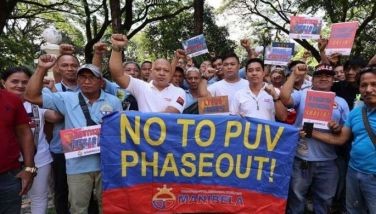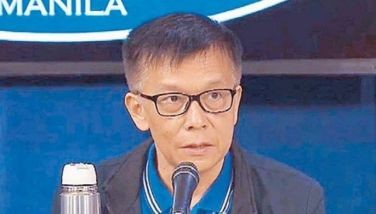Rody calls for legally binding code on SCS

President Rodrigo Duterte presides over the Regional Comprehensive Economic Partnership (RCEP) Leaders' Meeting at the Philippine International Convention Center on November 14, 2017. Rey Baniquet/Presidential Photo
MANILA, Philippines — President Duterte will push for a legally binding Code of Conduct on the South China Sea, Malacañang said yesterday as leaders of the Association of Southeast Asian Nations (ASEAN) welcomed the adoption of a framework that would pave the way for negotiations on a “substantive and effective” COC with China.
ASEAN and China have agreed to start talks on the COC. Encouraged by the “positive momentum,” the chairman’s statement of the 31st ASEAN Summit in Manila said the leaders of the regional bloc look forward to the start of negotiations at the 20th ASEAN-China Summit and the subsequent convening of the 23rd ASEAN-China Joint Working Group Meeting on the Declaration on the Conduct of Parties in the South China Sea (DOC) in Vietnam in early 2018.
The framework that was agreed upon in August seeks to advance the DOC, which has mostly been ignored by claimant states, particularly China, which has built seven manmade islands in disputed waters, three of which are equipped with runways, surface-to-air missiles and radars.
The chairman’s statement was released as Chinese Premier Li Keqiang concluded his visit to Manila after the ASEAN events and official visit in the country.
In the statement, the leaders took note of the improving relations between ASEAN and China, reaffirming their commitment to the full and effective implementation of the DOC in its entirety and the importance of undertaking confidence building and preventive measures to enhance, among others, trust and confidence among parties.
The leaders also welcomed the successful testing of the hotline between the ministries of foreign affairs of China and the 10 ASEAN countries or MFA-to-MFA Hotline to Manage Maritime Emergencies in the South China Sea and “looked forward to the operationalization of the Joint Statement on the Observance of the Code for Unplanned Encounters at Sea (CUES) in the South China Sea.”
“In our view, these are practical measures that could reduce tensions and the risks of accidents, misunderstandings and miscalculation,” the statement said.
ASEAN reaffirmed the importance of maintaining and promoting peace, security, stability, maritime safety and security, rules-based order and freedom of navigation and overflight in the South China Sea.
“In this regard, we further reaffirmed the need to enhance mutual trust and confidence, emphasized the importance of non-militarization and self-restraint in the conduct of all activities by claimants and all other states, including those mentioned in the DOC that could further complicate the situation and escalate tensions in the South China Sea,” the leaders said.
The leaders stressed the need to adhere to the peaceful resolution of disputes, in accordance with universally recognized principles of international law and the 1982 United Nations Convention on the Law of the Sea (UNCLOS).
They welcomed positive developments in maritime cooperation among ASEAN member-states, including through continued constructive dialogues on issues of common interest and concern, marine scientific research, maritime domain awareness and marine environment and protection.
During the meetings in Manila this week, leaders of the ASEAN, European Union and the United States committed to ensure maritime security, the rights of freedom of navigation and overflight, non-militarization in the South China Sea and other lawful uses of the sea.
Binding COC
Presidential spokesman Harry Roque gave assurance that Duterte and other ASEAN leaders want to work on a legally binding COC.
Roque said Duterte tried to negotiate with all the ASEAN member-nations to work for a code that would govern the behavior of countries at sea.
“I think the consultations on the (COC) was rather substantial because the different countries contemplated a (COC) that would in fact be legally binding,” Roque said.
“Otherwise, if it’s merely aspirational, then it will not promote the kind of peace and stability that they are hoping for. But anyway, we are only about to commence the process of negotiating a (COC). So we will see,” he added.
Roque said it was clear from Duterte’s statement that he wants the COC to be agreed upon by all parties to ensure peace and stability in the region.
“I think this was clear from the language also of the framework agreement that they previously entered into… which signaled the commencement of the talks for the (COC),” Roque said.
“I think that was a priority of the President because unless it becomes legally binding, we would not achieve the kind of predictability that all the countries want in order to achieve peace and stability in the region,” he said.
Asked what was substantially achieved during the ASEAN summit, Roque said it became clear that there was a consensus among all claimant countries and among Southeast Asian countries to ease the tension over the South China Sea.
“I think the fact that parties have now adopted the calm positions has led to stability in the region and has led to a tremendous reduction in tension as far as claimant countries are concerned,” Roque said.
Roque said Duterte is also open to bilateral talks as far as resolving the conflict is concerned and has said “time and again that he does not see any utility in talking to third parties who are not parties to the conflict.”
Roque said he does not think that the United Nations arbitral ruling favoring the Philippines’ maritime claims would “figure” in the drafting of the COC.
“As I said, the arbitral ruling is binding on China and the Philippines only,” he said.
“Well, even from my limited engagement in treaty drafting, I don’t see how it can figure actually. Considering that the (COC) is going to be applicable to all claimant countries and to all countries in Southeast Asia including China,” he said.
Bilateral solution: No use of threat or force
While negotiations for a code will commence, Roque said Duterte would also continue dealing with China bilaterally with regard to the South China Sea issue.
“And yes, I can confirm the report that the President has articulated preference for bilateral talks rather than multilateral talks in resolving the dispute. However, China… also stated that they have very good bilateral relations with all the claimant countries,” he said.
Following Premier Li Keqiang’s official visit in Manila last Wednesday, Manila and Beijing agreed not to resort to the threat or use of force in the South China Sea.
Instead, the two sides said the dealings should be based on friendly consultations and negotiations by sovereign states directly concerned.
As this developed, National Security Adviser Hermogenes Esperon Jr. said the Philippine Coast Guard will continue to take the lead role in conducting patrols in the West Philippine Sea and the Philippine (Benham) Rise.
Esperon was one of the officials who met with PCG officer-in-charge Commodore Joel Garcia yesterday morning, during the visit of Kentaro Sonoura, special advisor to the Prime Minister on National Security of Japan, at the PCG headquarters.
The Bureau of Fisheries and Aquatic Resources, on the other hand, would take charge of developing and conserving the country’s fisheries and aquatic resources.
‘Fantastic team’
All ASEAN delegates had left the country as of noon yesterday, the ASEAN Security Task Force (ASTF) said.
ASTF commander Director Napoleon Taas said the Chinese leader was the last delegate to the ASEAN Summit to leave the country.?“…we have successfully secured the country’s hosting of the 31st Summit and the 50th anniversary of ASEAN,” Taas said in a statement.
Taas and Interior and Local Government officer-in-charge Catalino Cuy said the government led by Duterte received all praises for the successful hosting of the ASEAN events, including security arrangements.
“US President Trump described his experience as fantastic. The Singaporean (Prime Minister Lee Hsien Loong) calls it a tough act to follow. (Duterte) refers to all of us as his ‘Fantastic Team,’” Taas noted.?Taas, however, said credit should be given to the thousands of personnel who contributed their best to ensure the success of the events.?“To the greatest security team that I had the privilege to lead, this is indeed a proud day for the nation. A day made possible by the nameless, selfless and dedicated men and women of the ASTF 2017,” Taas said.?Cuy said the country’s hosting of the 31st ASEAN Summit was a success, without even a single untoward incident recorded.
Cuy said a total of 60,000 troops were deployed and mobilized to provide security and safety to the world leaders, delegates and the general public during the summit. ?Cuy said the preparations for the summit were not a walk in the park but the Multi-Agency Coordination Committee was able to deliver what was expected through hard work with the numerous drills, simulation exercises, critiquing activities and rehearsals.
– With Evelyn Macairan, Cecille Suerte Felipe
- Latest
- Trending






























